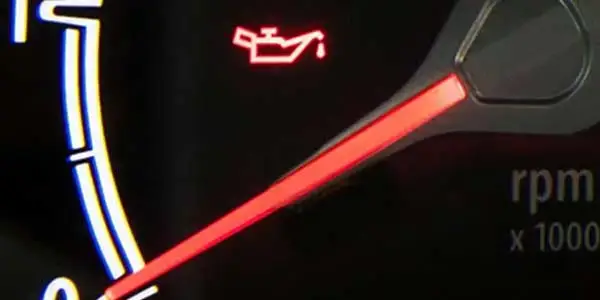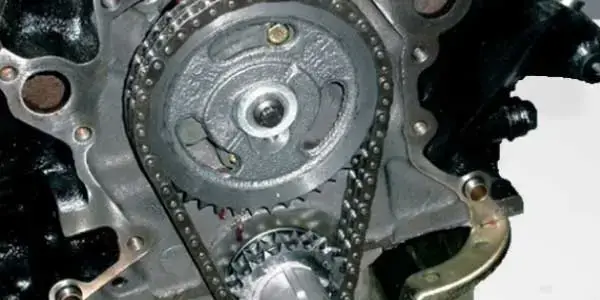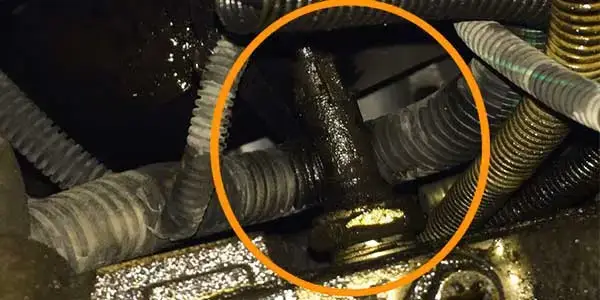Let’s face it, a malfunctioning oil pressure sensor is often to fault for engine issues. A rough idle, which is characterized by some shaking and bouncing movements in the car as the engine runs at idle, is one of the most frequent engine issues.
Vehicle lovers frequently questioned me about this sensor and asked me the following:
Can A Bad Oil Pressure Sensor Cause Rough Idle?
Yes is the quick reply. After all, low oil pressure in the engine could be the cause of the issue. Remember that a faulty oil pressure sensor can result in low oil pressure by affecting the valve lifters, which prevent oil from reaching all sections of the engine at the proper pressure.
Bad Oil Pressure Sensor Symptoms
The oil pressure light on your dashboard, a noisy engine, or performance concerns are the three most typical signs of a damaged or failed oil pressure sensor. Moreover, you might discover that the oil pressure sensor is dripping.
This is a more thorough list of warning signals of a malfunctioning or failing oil pressure sensor.
1. Oil Pressure Light On Dashboard

The oil pressure light on your dash cluster turning on is one of the most typical signs of a bad oil pressure sensor. When the oil pressure sensor detects low or high oil pressure, it transmits a signal to the engine control unit (ECU), which subsequently sends a signal to the dash cluster and illuminates the oil warning light.
Checking your oil pressure manually using an oil pressure gauge is the simplest way to find this issue. If the oil pressure is normal, a bad sensor is the likely cause. Using a fault code reader to check for any oil pressure sensor-related stored errors in your vehicle’s ECU is another way to diagnose this issue.
2. Noisy Timing Chain and Engine

The importance of maintaining the proper oil pressure increases if your engine has an oil-fed timing chain. This is so that your chain may continue to move freely and remain lubricated, which it does by drawing oil from your oil pump. Another factor supporting the importance of maintaining oil pressure is the fact that the tensioners that keep the chain’s tension in place are frequently oil supplied.
If you hear this coming from your engine yet the oil light isn’t on, there may be a problem with your oil pressure sensor. After making the necessary engine repairs to fix the chain problem, if your chain has lost its tension as a result of low oil pressure and your oil light isn’t on in your dash panel, you should replace the oil pressure sensor.
If your oil pressure is low, other parts may also be noisy.
3. Oil Leak from Oil Pressure Sensor

Your oil pressure sensor is made to fit within your car’s oil system so it can measure the oil pressure. Yet occasionally, this can cause your oil pressure to leak, either via the sensor’s center or from the threads.
Examining the area around the pressure sensor for any oil leaks may help you quickly identify this problem. To check for oil, unplug the connector from the sensor’s block. You must replace your sensor if you discover any oil in either of these areas. When the engine is idling, you can also visually inspect the sensor to ensure sure there is no evidence of oil escaping from the sensor body.
Can A Bad Oil Pressure Affect Idle?
Yes is the short response. When the oil pressure is irregular, it may signal that not all of the engine’s internal components are receiving the necessary amount of oil.
Thus, this could result in friction between those parts, which could lead to shaking and vibrational movements that are simpler to detect while the engine is running at idle.
The first thing you should check is your oil pressure sensor if your engine is behaving strangely while idling as previously indicated. It’s possible that the sensor is malfunctioning and can’t do what it’s supposed to do, which is to open and close the valve lifters as needed.
This could indicate low oil pressure and friction in your engine’s internal parts, which could be the causes of the harsh idle.
Sadly, when attempting to determine why their engine is idling poorly, many customers neglect to consider their sensor.
Can a Bad Oil Pressure Sensor Cause Reduced Engine Power?
Absolutely, yes. Despite the fact that there are conflicting views, this will undoubtedly have an impact. I’ll tell you why a damaged oil pressure sensor will probably reduce the power of your engine:
The sensor won’t be able to fulfil its purpose as intended, to start. As a result, the oil pressure in the engine will decrease because the valve lifters will have a harder time opening and closing the valves, which is necessary for enough lubrication to reach the engine’s internal components.
This will cause friction and harm to the vital parts that give your engine its power. The crankshaft, which is effectively the engine’s backbone, is one of them.
The state of the crankshaft is one of the well-known aspects that can diminish or improve the engine’s power, which is expressed in horsepower (HP).
Your engine’s output will be reduced if the shaft is unhealthy as a result of problems like inadequate lubrication. Yet, if it’s in good condition and well lubricated, the engine will be able to produce its full power without difficulty.
Do Poor Oil Pressure Sensors Cause to Knocks?
Many people are accustomed to the smooth rumble of an engine running normally. Instead, if the engine is making a louder, more frequent pinging or tapping noise that gets louder as the car’s speed rises, this is known as knocking.
When the fuel burns unevenly or all at once rather than smoothly in small, controlled pockets, the engine will mostly knock. This is typically brought on by an unbalanced air-fuel mixture in one or more cylinders.
This issue can be brought on by an oil pressure sensor that isn’t functioning properly since it can’t tell the valve lifters when to open and close the valves.
Can a Bad Oil Pressure Sensor Cause No Start
Another reason a sensor fault could make it difficult to start the engine is to protect the engine from damage. In some models, if the oil pressure sensor isn’t operating properly, your car might not start. This sensor informs the computer whether the oil pressure is appropriate. Since correct lubrication depends on the effective flow of engine oil, a damaged or unable sensor may cause the ECU to enter a fail-safe mode.
The computer might stop the engine from starting if it signals that the pressure is low. It can be a clue that you have a defective sensor if the signal was sent incorrectly or not at all.
Can a Bad Oil Pressure Sensor Cause Misfire
Quick Answer: Low or faulty pressure don’t cause misfire.
The combustion chamber has nothing to do with low oil pressure. Low oil pressure, on the other hand, can cause the engine to shake, make more noise, and have less power. Because of this, many people mistake low oil pressure for an engine misfire.
Further Explanation Why Misfiring is not related to Bad Oil sensor:
- The engine can’t misfire because of low oil pressure. A misfire happens when the combustion process in the cylinders isn’t complete, which has nothing to do with oil pressure.
- If the oil pressure is low, the engine will make knocking sounds that tell you there isn’t enough grease.
- Low oil pressure can be caused by sludge buildup, which stops oil from flowing around the engine.
- When you drive a car with low oil pressure for a long time, the friction between the moving parts can lead to a rough idle.
- Low oil pressure can cause engine parts to wear out too quickly, which can make the engine louder and hotter.
Cost to Replace a Bad Oil Pressure Sensor?
Depending on your car type, a replacement sensor typically costs around $65.
Depending on where you choose to take your car for the repair work in addition to your car model, labor can cost between $80 and $100.
Other Parts That Can Cause Rough Idle
Many other things can lead to a rough idle; we will cover some below.
CPV Valve
A one-way valve called a PCV prevents exhaust gases from returning to the engine block. When they stop working, the exhaust gases might re-enter the block and disrupt the flow of fuel and air. The car will idle poorly if the ideal gas-air ratio is broken.
Valve EGV
Hesitation, stumble, and harsh idle are all signs of a stuck EGV valve. If this is the case, it might be time to give the valve a thorough cleaning. Some carbon soot can also hold the valve.
Fuel Injectors and Spark Plugs
Spark plugs or fuel injectors may very likely be to blame for your engine’s harsh operation.
Your fuel may burn improperly as a result of a damaged spark plug, causing a rough idle. Typically, spark plugs need to be changed every 50,000 miles.
Spark plug and fuel injector carbon buildup is a result of insufficient fuel combustion. Carbon buildups can obstruct airflow, alter your engine’s operating parameters, and cause a rough idle.
Clogged air filter
The purpose of the air filter is to stop dirt, dust, and other tiny particles from entering the engine. It may be time to update your air filter if you haven’t in a while as this might occasionally result in harsh idling.
Engine Knocking Noises
Normal tapping noises from low oil levels in an engine are replaced with knocking noises when the oil level drops.
You must act right away because this is a serious situation. This noise is a sign that there is insufficient oil in your engine, which is causing the pistons, valve trains, and camshaft to overheat. These components will distort if you keep driving, and you might need to completely rebuild the engine.
